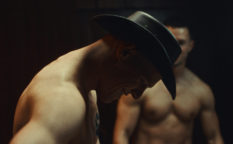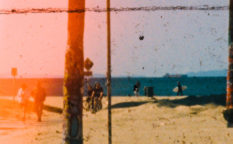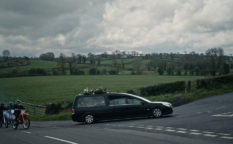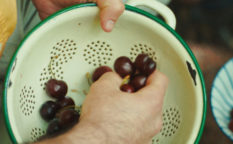Thom Lunshof and co-screenwriter Sam Dijkstra speak about their short ‘Harmonia’
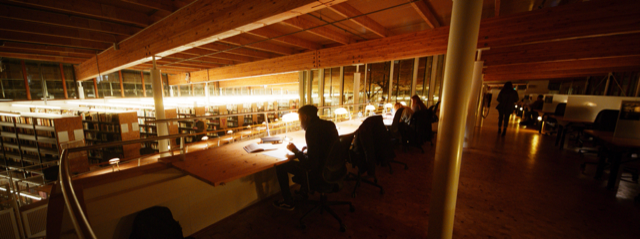
Harmonia tells the story of a student who’s dedication to her rowing team sees her go to extremes, punishing her own body and alienating her from the people around her. But Philine (played with a magnetic dedication by Nora El Koussour) is not the only member of the student body putting herself under pressure. A mysterious voice circles the libraries, common rooms and lecture halls invading the internal monologues of the students and creating an atmosphere of barely contained pressure.
The ambitious 25 minute short has been doing the festival circuit and winning prizes. I caught up with director/ screenwriter Thom Lunshof and co-screenwriter Sam Dijkstra at FEST the New Directors/New Films Festival at Espinho Portugal. Sam tells me about the origins of the project: “We started two years ago with this article about mass hysteria. The more we looked up the more interesting it became for us. Two months into development we started to research but we didn’t know what to do thematically.”
Thom Lunshof continues: “We wanted to do something in our own environment. And one of things we discovered was how much pressure there was for students in an academic context. One in five people in Holland were experiencing a burn out before they were 25 and this was something that caught our attention. So we thought that pressure is something like mass hysteria and so we created a story where there was an event of mass hysteria in a university.”
The look of the film is as polished and smooth as some of the long shots which glide through the library picking out students like victims. It’s bravura work reminiscent of Wim Wenders’ Wings of Desire. “It wasn’t that expensive;” Thom insists. “In film academy terms, it was but our budget didn’t get to 50K which for a short film is fairly normal. It was a big challenge. The production values seem fairly high but that’s really because we were students and we had six months to prepare the movie and a lot of people including our main character, played by Nora El Koussour worked for free. A lot of people worked for free. Some camera people and some grips likewise. They were very experienced but they liked the ambition of what we wanted to achieve.”
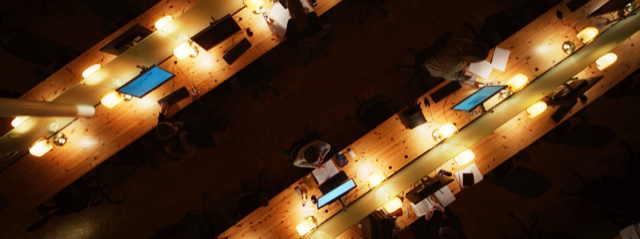
The extended preproduction proved a bonus.
SD: “We knew thematically for a long time what we wanted to do and a lot of our peers came up with their story a lot sooner than us. At one point we had so much research, it became a problem because then when we would try to introduce a story it didn’t capture and include everything we wanted it to. We experimented a lot with our main character. It started with a sister and brother and we wrote a whole screenplay that was a totally different story. So we used that time to experiment and then we would throw things out.”
TL: I invited the crew and the cast very early on in the process. I saw Nora play in a short film in a Dutch festival and I reached out to her and she read the second draft of the script and from then on she was very close to the writing process. She met with me and the DP and the whole crew so that she was imbedded in the whole process of making the film. So it helped when we were shooting the bigger more impressive shots to not lose sight of the human story which is mainly her story. What’s her theme and what’s development, rather than the big flashy long takes.
SD: What’s important about this long takes is that it’s already something that started in the development process. We wanted to show that the whole school was under this pressure and the DOP came up with a very good way of visualising that, but thematically it was always part of the story.
TL: We never spoke about making something that can show off our skills. It came organically. The young filmmakers understand that momentum is vital at this stage of their careers.
SD We’re writing a new script. We’re writing right now as well. It’s nice to think of it as a our Pulp Fiction.
TL: We are also writing a feature film. It is in very early stages. We’re a half year into the writing process. It’s a good place to experiment. Writing a synopsis and treatment for a longer film is something we’ve never done before so we’re also learning. It’s a film school 2.0.
SD: It’s nice to experiment with a long form because when you come back to the short form it makes you look at it differently. When we were writing our first short, it felt like we were crossing the ocean. 25 minutes, that’s so big for us!
TL: We waited a bit because there was corona but now there’s an idea we both love. It’s going to be about man versus nature in the sense of how we are related to nature. Do we still know it. Can we still have a relationship with nature or have we moved past the threshold and we can’t go back? That’s a kind of fake answer but that’s the big thematic area we are interested in.
SD: And we’re approaching it in a genre way. We’re approaching this question.
TL: Some people describe Harmonia as a horror movie, but what we love about film is that we play with genre element. So we’re not making it a complete horror or sci-fi but we’re using elements in order to keep a closer touch on what we want to say.

